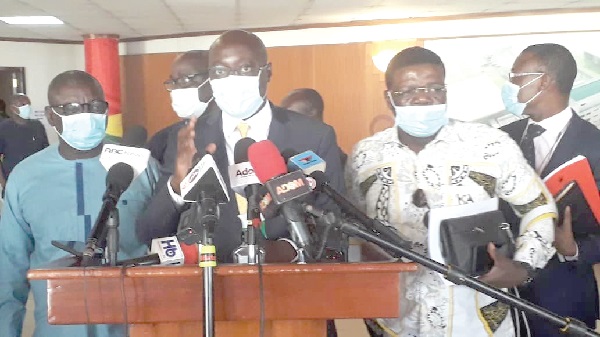
Mid-year budget another govt manifesto promise — Minority
The Minority in Parliament has described the mid-year review of the 2020 budget statement by the Finance Minister as another manifesto promise that offers no hope in alleviating the suffering of the ordinary Ghanaian.
It said the announcement by Mr Ken Ofori-Atta that the President would soon launch the GH¢100-billion Coronavirus Alleviation and Revitalisation of Enterprises Support (CARES) programme from 2020 to 2021 to recreate the economy was only a mere manifesto promise.
“Clearly, this is not the time for the Finance Minister to announce this programme, as it is a manifesto pledge and the mid-year review document is not for manifestos,” the Minority Spokesperson on Finance, Mr Cassiel Ato Forson, said.
Speaking to journalists after the Finance Minister’s presentation of the mid-year budget review, Mr Forson said: “Mid-year review is for the Finance Minister to review the existing budget and not for him to come and read to us a new budget.
“He was not only reading a new budget; what he has done means that he has actually introduced a manifesto promise into official documents and we urge the ordinary Ghanaian to be mindful that this mid-year review brings about nothing,” he said.
He also urged Ghanaians not to be swayed by the government’s intention to reduce the communications service tax (CST) from nine per cent to five per cent, saying that “it is the same administration that increased the CST, in the first place”.
No accountability
Mr Forson, who is the NDC Member of Parliament (MP) for Ajumako-Enyan-Esiam, said the government had spent GH¢11.1 billion on COVID-19 expenditures this year, without giving Ghanaians a breakdown of how the money was expended.
“We had thought the Finance Minister would use this golden opportunity to provide Ghanaians a breakdown of what the GH¢11.1 billion was being used for, but he did not,” he said.
He indicated that the original 2020 budget had stated that the government would borrow an additional GH¢18 billion, but the Finance Minister only appeared in Parliament to tell Ghanaians that the government would rather borrow GH¢44 billion this year.
“This means that by the end of 2020, Ghana’s public debt will be approximately GH¢280 billion, from the GH¢120 billion the government inherited. This means that the public debt will be 74 to 76 per cent of GDP,” he said.
The MP pointed out that the government also intended to borrow an additional GH¢16 billion from the domestic market, as contained on page 112 of the mid-year review document, saying: “What is happening is scary.”
He noted that in spite of the fact that multilateral institutions had decided to hold on to the debt Ghana had to pay from 2020 to 2021, the government had projected that it would spend another GH¢4.5 billion on the already GH¢20 billion plus as interest payment.
“This means that Ghana’s interest payment will increase by GH¢4.5 billion, obviously as a result of the government’s reckless attempts to borrow, and this is unacceptable.
“You cannot, as a government, come to office with the public debt amounting to about GH¢120 billion and increase it to GH¢280 billion, with very little to show when the government has had resources in excess of GH¢300 billion at its disposal,” he said.
NDC impossibilities
In reaction, the Government Spokesperson on Finance, Mr Dan Okyem Aboagye, said the opposition NDC had never believed in any good work the government had promised to initiate to better the lot of Ghanaians.
For instance, he said, when the then candidate Nana Akufo-Addo promised free senior high school education and the payment of allowances to trainee teachers and nurses, the NDC described those promises as impossible.
“So the NDC is a government of impossibilities; they do not expect us to be capable of doing anything we say we will do and they will never provide any constructive alternative solutions,” the NPP MP for Bantama said.
With the government desiring to have a deficit of 11 per cent plus of GDP, he said, it was the incumbent government which, in December 2018, passed the Fiscal Responsibility Act to restrain excessive spending, especially during election periods, to ensure fiscal discipline.